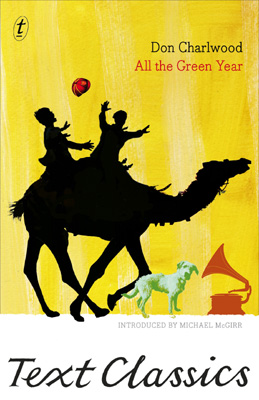
All the Green Year by Don Charlwood, 1965
Cover by W. H. Chong
Text Publishing edition 2012

All the Green Year by Don Charlwood, 1965
Cover by W. H. Chong
Text Publishing edition 2012
The winners of the 2012 Inky Awards were announced yesterday on the "Inside a Dog" weblog. These are international awards for teen literature. The Gold Inky is for Australian authors, and the Silver Inky for International writers.
The winners were:
Gold Inky
Shift by Em Bailey
Silver Inky
The Fault in Our Stars by John Green
You can read the shortlists here.
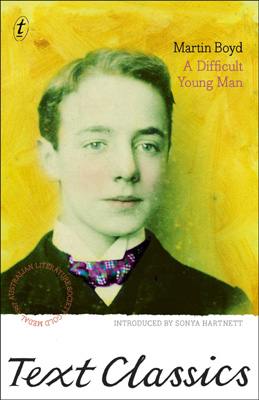
Ticonderoga Publications is a small press based in Perth which specialises in science fiction short story collections. The founding editor is Russell B. Farr. He recently spoke to the Speakeasy weblog.
Speakeasy: Can you tell us a little about Ticonderoga Publications (TP) and its place in the Aussie speculative fiction (SF) community?
Russell Farr (RF): Ticonderoga Publications started in 1996 initially to produce a chapbook of the Howard Waldrop and Steven Utley story, Custer's Last Jump, as I was involved in a convention bringing Waldrop to Australia. It was a small print run, Shaun Tan provided the cover, and it sold for $7.95. At the time Jonathan Strahan and Jeremy G. Byrne were doing remarkable things with Eidolon - both the magazine and also books - and they put up with me hanging around asking dumb questions. At the time the main indie book publishers were Eidolon, Mirrordanse (Bill Congreve) and, standing head and shoulders above them, was Aphelion (the late, great Peter McNamara). I thought what they were all doing was pretty cool, so I was soon following along, publishing collections of stories by Steven Utley, Simon Brown, Stephen Dedman and Sean Williams.
Jump forward to 2012 and we're still going. We've expanded to include my wonderful fiancé, Liz Grzyb, as business and creative partner, and we've got between 25-30 titles in print. We've published collections by Angela Slatter, Lisa L. Hannett, Kaaron Warren, Felicity Dowker, Justina Robson, Lucy Sussex, Greg Mellor, the late Sara Douglass, and a number of others. We've been able to produce a number of anthologies, a Year's Best Australian Fantasy and Horror series, and next year will start publishing original novels.
We've never set out to have an agenda, or a place in the Australian SF community, we just happily hang out there and make what I hope are good books. We don't really see ourselves as catering to any niche, just publishing what appeals to us - we see so many fantastic writers and want to share them with the world.
Significant prose appeared in Australia later than poetry. If in the last decade the novel has arrived with a strange rush, it had been preceded by 50 years in which the joke about our huge crop of spring poets was as monotonous as the mother-in-law joke in America. Furphy, Lawson, Barbara Baynton -- a few names of story writers stood out like islands in an ocean of balladry. This lag in prose was caused, I would cautiously suggest, largely by external conditions. For the novelist there existed no vehicle at all, but it was possible for almost any competent verse-writer to be published in some journal, the awful truth being that he has consistently been paid by the line, by quantity, instead of quality, with every incentive to pad; and all honour to those who have kept sound and terse! After appearing in a journal, a poet could fairly easily publish his work in book form -- at his own expense, of course, for that is expected of a poet. It costs less to produce, in the usual small edition, the comparatively few words of a poet, stringing down the page like a small mob of cattle, than to publish the sixty, eighty, or a hundred thousand words of a novel and to put that novel into effective circulation. The publishing of poetry can be an amateur matter: to publish novels steadily, a country needs to be more professional in its publishing habits, a little more grown up. Even when our novels of the past decade were actually published abroad, they were more or less well circulated here and helped to change the whole literary outlook.
No Audience in Advance
What novels were these? One after another, they were so unexpected, and their writers' names usually so little known, that it was natural to call them novels from nowhere. Not that they lacked marks of their origin: from Katharine Prichard's "Working Bullocks" in 1925, to F. D. Davison's "Man Shy" three years ago or Brian Penton's "Landtaker's" last year, each one belonged to some part of this huge and varied country. If they came from nowhere, it was that they came like rain from a blue sky. As Joseph Furphy said roundly about his "Such Is Life," they were definitely not written in answer to numerous requests. Our novelists had no eager audience in advance. Perhaps the same blank was felt by a novelist in Russia before Gogol and Goncharov; perhaps it was felt in America a hundred years ago, when Fenimore Cooper timidly began his literary career, I understand, by writing society novels set in the drawing-rooms of London, where he had never been. What it was that turned him bravely in the direction of the Redskin I don't know, but there it was, and his books made it seem natural for Americans to expect something interesting; from their country. With us the age of such a discovery is still in the present. Those of our novelists whose books are something more than imitative commercial products have had to write without models, and to descry their own patterns of life in this chaos; their work has indeed been
All carved out of the carver's brain.
Attempting what had not been touched before they had to be original or perish, and they have not perished.
If one names a certain few of these, it is because their influence as part of what has been called the "literature of direction," has been so important. In these notes I can only suggest how our literature has begun to develop and perhaps indicate a few growing points. As a novel of "direction" as well as for its own greatness, H. H. Richardson's, trilogy, "The Fortunes of Richard Mahony," stands out; the only trouble is that it could not arrive several decades earlier. In Australian novels the literary pace was set in the nineties -- with no guarantee of maintenance -- by a novelist like Boldrewood, who for all his robust qualities had a "colonial" attitude and observed the conventional formula of the happy ending. If at that time we had had an H. H, Richardson, somewhat as South Africa had as her literary initiator, Olive Schreiner, the doors of opportunity for our genuine literary expression would almost certainly have been forced open long ago, and publishing houses would have become active far sooner. As it is, the existence of the Mahony trilogy has made publishers less reluctant to handle Australian books of literary quality, and readers less automatic in their demand for a happy ending at all costs. It used to be assumed, at least by publishers, that an Australian novel would give its characters plenty of physical adventures, plenty of "out-west," but no complex adventures of the spirit. That we are just beginning to live that down is due largely to the world-wide respect for H. H. Richardson, who, after her great European success with "Maurice Guest," thought it worth while to give 15 years to the construction of a novel on Australia's major historical problem -- that of the immigrant in all his resistances, faced by this new country in all its early crudities.
A True Prospector
The literary courage of a novelist like Katharine Prichard it is impossible to express except in comparing her with a prospector in the desert, and having only a few tools. In "Working Bullocks" she first found her true tune, weaving into her prose the bush sounds and words and little songs that nobody had known how to combine before, and thus presenting her illusions -- a bullock team in a jarrah forest, men working in a timber mill, lovers picnicking in a drowsy hillside noon. Her style is a very subtle web, but because she constructs it out of dead leaves and sticks as well as diamonds, its quality has often gone unnoticed. Her successive books have opened one window after another upon our scene; one of them, indeed, as an admirer wrote in a recent book, "Haxby's Circus," "moves like a gaily coloured beetle across the Australian panorama"; but to suggest as Professor Hancock did some time ago that Miss Prichard has merely covered our geography with descriptive writing is to miss her fathomless and unfailing human sympathy.
Novels from nowhere
There was F. D. Davison's beautiful small book, "Man Shy," cunningly reviewed once by Elzevir in such a way as to astound you when he at last revealed that the attractive, tragic little heroine was a wild cow. In an American edition just out there is no ambiguity, for the title is "Red Heifer." There were those unexpected books of crowded adventures and reminiscences, chronicles of the early days in the romantic Snowy River country, by Brent of Bin Bin: "Up the Country " and "Ten Creeks Run." Several years have passed since M. Barnard Eldershaw's decorative and four-square novel of old Sydney, "A House Is Built," was followed by a smaller canvas, "Green Memory," but this composite author has not said her last word. Leonard Mann's war novel, ''Flesh in Armour," in itself would justify a surmise that we were now adult: in his fearless adherence to invigorating fact and his few passages of lyrical ecstasy this writer shows that the novel is not his master, but his biddable slave.
If like many people I am unwilling to believe that poetry should yield any of its real territory to prose, still I am convinced that the production of imaginative prose literature is necessary to any country to-day. What is a novel? "The development of character through narrative" is a definition that will serve. We need interpretation in such a form, and we are gradually getting what we need. Our novelists are now, if not encouraged, at least permitted to write in the fullness of their talent. Some of their books, in a secondary function, may, like "Man Shy," act as our ambassadors abroad.
First published in The Argus, 9 March 1935
[Thanks to the National Library of Australia's newspaper digitisation project for this piece.]
Vance Palmer, who has won the first prize offered by "The Bulletin" for a serial this year, is a Queenslander, although he is at present living in Victoria. Last year he was also a prize dinner in this competition; and his recent novels and stories have been of such exceptional quality that no one is surprised at their success.
His many friends winner and admirers will be delighted, for Vance Palmer is one of those Lamb-like men whom everybody loves. His kindliness and charm of manner are reflected in his writing; as also the tranquil depths of his austere mind and sensitive humor. He has written poems and plays, essays and novels, the best known of which are: "The Forerunner" (poems), "The Black Horse," a one-act play, "The Man Hamilton," a novel, and "Men Are Human" to be published in book form presently.
After wandering about the world a good deal in his youth, inspecting a revolution in Mexico and journeying across Siberia to call on Tolstoy, Mr. Palmer lived some years in London, Paris and New York, contributing yarns of adventure and more serious sketches to the "Munsey Magazine," "Adventure," "The New Age" and other reviews. In 1913 he married Miss Nettie Higgins, a niece of Justice Higgins, herself a poet and critic of distinction, and renouncing dazzling prospects in England and America, came home to devote himself to a knowledge and expression of his own country and people.
So capable a craftsman might have made the easy fortune which is to be had by churning out horrors or cowboy romances. But Vance Palmer is an idealist, the most generous and single minded of men, and so devout in his service both to literature and this country that he has given the best he is capable of in his books always.
First published in The Daily News (Perth), 26 March 1930
[Thanks to the National Library of Australia's newspaper digitisation project for this piece.]
Note: I wonder if the "K.S.P." here is Katharine Susannah Prichard.
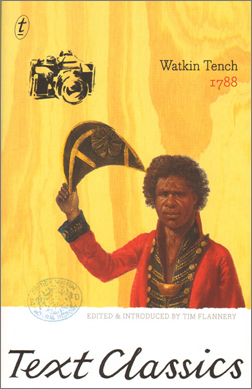
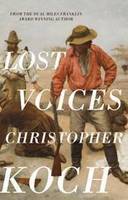 |
Born in 1932, Christopher Koch has won the Miles Franklin Award twice, for The Doubleman in 1985, and for Highways to a War in 1996. He is now back with a new novel, Lost Voices, and he recently spoke to Susan Wyndham for The Age. |
The book a man produces at 80 might be seen as a map of his life's deepest concerns, and so it is with Christopher Koch's Lost Voices. The novel, like the man, has returned to his native Tasmania and it began, he says, with his ''interest in the idea that the past resonates off the future. I've done it before in Out of Ireland and Highways to a War, but this time I wanted it to be within a family.
''I wanted to look back from a distance at my childhood. This is probably the least autobiographical book I've written in terms of the characters, but I've tried to create a sense of what it was like here in the 1940s. At my age you realise you are living in a different world from the one you grew up in.''
[...]
In Lost Voices, ''every character in the 19th century has a counterpart in the 20th century''. In life, Koch says, ''things that happen in the past have counterparts in the present. We have ancestral memories - it sounds a bit far out but so many Australians go to Europe to the places of their ancestors and recognise those places.'' Koch himself remembers travelling through Switzerland and feeling that he'd been in a particular valley before.
He also cites scientific research into animal memory. ''Chickens run from the shadow of the hawk and they have never seen a hawk; certain memory circuits are inherited from the mother. If animals have this, why should it not be stronger in humans?''
If the achievement of Bernard O'Dowd in the development of Australia's literary life was to reconcile what I have had to call the belltopper and the moleskin, there have been other poets, slightly more recent in their activities, whose achievement it has been to take such a reconciliation for granted. As writers, both the hesitating colonial gentleman and the robustly crude bushman were to be followed by those who were neither childish, like the first, not adolescent, like the second, but adult. Australia, to a writer in this modern vein, does not seem, as America to Henry James, a meaningless and dreary place of exile. It is not a colony to exploit but a home and he grows up in it naturally and critically.
Consider in this light William Baylebridge, a writer so typical, such a symbol, that we should have to invent him, though we should hardly be clever enough. Like O'Dowd, this poet is conspicuous for a certain dignity and austerity, but these of a type all his own, differing from O'Dowd's more and more as you penetrate the stately avenue of words. His important book of 123 sonnets, "Love Redeemed," has just been published and made accessible in the ordinary way. One mentions this matter of publication because for more than 20 years this writer has been apt to appear in limited editions, privately printed, subtly circulated, very remote -- more remote even than the usual poetry in a "practical" community like ours. One further point is that when Baylebridge began to write -- his first book of poems appeared, I think, in 1912 -- and for long afterwards, he used the name of William Blocksidge. Those who read Baylebridge and therefore want more of him should not make the mistake of passing by a book with Blocksidge on the title page.
An Individual Type
William Baylebridge presents throughout a peculiarly unswerving literary type. Whether writing in the strict sonnet or the most untrammelled of free verse, whether making verse or prose, he is always himself, a composite, an amalgam from his personal heritage and experiences, but above all, and at great distances of time, a unity. In diction he shows an eclectic archaism liable to be fused, very thoroughly with a racy modern slang, as in the prose of Shakespearian soldiery. His sensuous images, when concerned with landscape, are sometimes general, as if taken from a common poetic treasury, but taken with this poet's own strongly conceived purposes and rhythm ever in mind:
The wind, that sedulous shepherd of the skySometimes again his images spring from an individual vision which his style endows with a universality. In another of the new sonnets there is a characteristic passage where the very name of the wind, having a slight extra syllable, shakes the line: -
Oft lo! on some veiled hint, the southerly woke
Baylebridge's ideas and sometimes his verse forms are heavily tinged with German literary influences which he experienced in his youth; influences of the more epigrammatic and lyrical sort. Some of his brief early lyrics in "Moreton Miles" were surely influenced by Heine. As for his prose style, at least in fiction, I have an admission to make. There is only one man whose work, from its style and subject-matter, I was once inclined to ascribe to Baylebridge. That was Mr. A. W. Wheen, whose "Two Masters," an unforgettable short story of the war, appeared perhaps 10 years ago in the London "Mercury" and has often been reprinted in anthologies and as a small chapbook. The man who found he could not serve two masters was a soldier in the Australian forces, who, on account of his intimate knowledge of German, was detailed as a spy. Behind the German lines he involuntarily makes the most intimate friendship of his life, the two men leading and thinking together in excitement and joy. When the hour strikes for the work he has come to do, the spy cannot bring himself to complete it, but walks out into a barrage on No Man's Land. This story, with its dignity and fullness was not, after all, by Baylebridge author of "An Anzac Muster," with its chain of stories. Mr. Arthur Wheen, also an Australian, is an author in his own right, and as a translator has been responsible for perhaps the most famous of all German war-books. The resemblance in style between the two writers is remarkable, to judge from "Two Masters." Striking, too, was the coincidence that two Australians should be so closely intimate with German literary expression.
Epigram and Essay
For the rest, Baylebridge's prose style in epigram and essay is his own. In a curious book of related fragments, called "National Notes," he set down part of his credo some years ago. If I have called him the examiner perhaps some of these notes will go far to explain why, though the same questioning -- not wistful, like O'Dowd's, but rather an assured challenge -- pervades his poems, too.
The time has arrived for a judicious examination of our convictions, our principles, our dreams.
Leave the past and live in the present; in the mind of the present even must the past be conceived. Let not the present live at the cost of future.
We would fling large gifts, fling gifts with both hands into the abyss of the future.
Baylebridge very early evolved for himself a diction that seems always competent to express his particular view of life -- vigorous yet subtle; a diction nobody else could use. With the sweep of Elizabethan rhetoric, yet with the vision of a new country always before his eyes, he can use old, robust words and make them his own: some of them being rather Latin words that peered into English, centuries ago, and then withdrew, words we could have done with very well. "The utile canons," he writes in one sonnet, and then --
Who lifted man from earth ignores his fuss,I have been led on to transcribe the whole sonnet! It is for the reader to see how the man who uses half-forgotten, yet vivid, words, such as "queasy coils" and "affined," can somehow handle, in verse, a prosy word such as "fuss" and make it work hard and well. If may be said, indeed, that Baylebridge wears neither the Victorian's belltopper nor the bushman's moleskins. His costume, worn as naturally as a bird wears its feathers, has something of the Elizabethan about it, a hint of inconspicuous Australian khaki, yet the general contour of modern man. If he has suffered as well as gained by being an Australian, it is in this way, that to be a writer in this country is to be a disregarded person engaged in a freak occupation, and there may creep into the words of even the boldest and least apologetic of poets a slight note of isolation, a take-it-or-leave it obscurity of phrase. Past any such obscurities, however, comes flooding Baylebridge's strong assurance that we can share in the whole of life; that we are not, as the phrase goes, cut-off and isolated, but here, and ready for the future.
First published in The Argus, 2 March 1935
[Thanks to the National Library of Australia's newspaper digitisation project for this piece.]
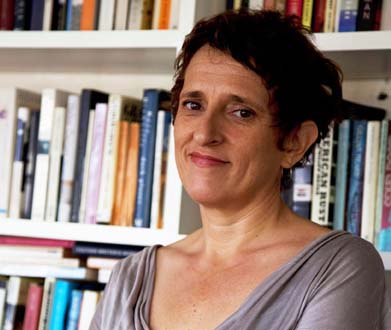 |
Charlotte Wood is the author of four novels, editor of the anthology Brothers and Sisters, and Love and Hunger, a mediation on the pleasures of simple food. She recently spoke to Jo Case for the Wheeler Centre. |
Do you identify as an Australian writer?
I don't especially, but I'm often told that I am a particularly Australian writer. I think it's more a result than from intent; particularly in my last couple of novels (The Children and Animal People), I've written about what I've seen around me in contemporary Australia.
I think perhaps it's something akin to having an Australian accent - something you can't help - rather than a conscious thing.
So, it's not that you're setting out to be a particular kind of Australian, or that you think of yourself as an Australian writer?
I don't even know what makes a writer Australian, apart from working here - but even that is debatable when you think about Peter Carey or Shirley Hazzard. I remember hearing a Canadian publisher at one of our writers' festivals say, 'If I'm going to publish an Australian novel, it's got to be really Australian. It's got to be identifiably Australian, otherwise why don't I just publish a Canadian novel?' And I thought, well how would you know what's 'really Australian'? And perhaps you might publish it because it's interesting.
I once had a meeting with an agent in London, who wasn't interested in my work. That part was fine, but she said, 'Look, write something really Australian and then we can talk'. I was completely bamboozled - I thought, 'I don't know what you're talking about.'
But I think what she was trying to say, basically, was 'be more like Tim Winton'. I can see why readers abroad might pick him as especially Australian, given the settings for much of his work, but it's a bit depressing if that's all they see. He writes very beautifully about a great many things other than landscape and Being Aussie. Like being a son, a lover or father or a brother, about self-destruction, about growing up, about mystery, and regret ... just about being human really, I think. Sometimes I wonder what he must feel about being so corralled into being the 'Aussie story' pin-up boy. I would find it depressing if I were him.
This agent ... I was sort of just sitting there like an idiot, and then she said, 'Oh, Scots writers are always moaning because we say, we want proper Scottish writing and they say, this is Scottish writing."
Although he has lived in Sydney for the last 20 years, since returning to Australia from England, William Baylebridge is Brisbane-born and educated, an old pupil of the East Brisbane State school and the Brisbane Grammar. He is the greatest poet Queensland has produced.
Baylebridge's poetry is frequently very obscure, but his lines are as polished as an agate; and he is one of the few really accomplished writers of poetry in Australia. His latest volume is entitled "Sextains"; and, like, all that he has published of recent years, it has been issued from his own private Tallabila Press, beautifully printed and delicately bound. In this work Mr. Baylebridge is as keen a craftsman as he is a poet, always a lover of the beautiful.
What he calls 'Sextains' are poems of six lines, each complete in itself. In the sonnet he has no equal in Australian poetry, although many of those in "Love Redeemed" are obscure in meaning and full of the conceits of the 17th century poets, who have had on him a curiously marked influence. In the same way he has made himself a master of the sextet, a vehicle of verse that is rarely used because of its rhythmic difficulties and its need for compression. Mr. Baylebridge has collected 40 of them. That entitled "The Miracle" is an illustration of his mastery of this kind of verse:
My heart: its birds away, its branches bare,
Swooned in eclipse; the wind through these that sighed,
Chill-breath'd, seemed 'burthening, in some lost despair.
Its perished music and its withered pride.
You laughing came: it woke; and flowering wide,
All Spring was there!
All are like that: lines of intense beauty, but obscure in meaning until you seek it out. However obscure he may appear to some readers, he is certainly not slovenly. He knows what he wants to express, and he will search until he has found the one word that will serve the purpose. Like the poetry of Chris Brennan, it is not popular, but popularity is not one of the things that William Baylebridge has ever sought.
"SEXTAINS," by William Baylebridge (private Tallabila Press, Sydney).
First published in The Courier-Mail, 28 January 1939
[Thanks to the National Library of Australia's newspaper digitisation project for this piece.]
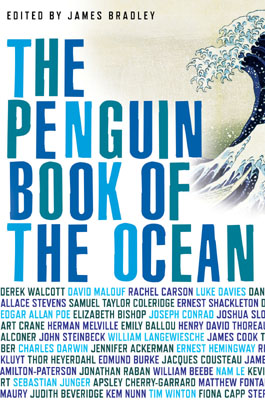
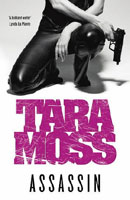 |
Tara Moss moved to Australia in 1996 and published her first novel, Fetish in 1999. Since then she has gone on to be one of the highest-selling crime writers in the country. Her latest novel, Assassin, has just been released and she spoke to Karen Hardy for The Age. She began by talking about recent misogynist statements from the likes of Alan Jones. |
"We should call out inappropriate comments, like these ones, when they're made; we should encourage women to follow their dreams, whatever they might be; encourage more women to take part in public life, if they're able. Obviously it's not the life everyone would choose but there is real value in encouraging women to not only know they're able to take part in public life in a significant way but in showing it as something aspirational.'' She sees something of this in her role as an author. Her latest book, Assassin, the sixth and final installment in the Makedde Vanderwall series, is out now.
''I'm a crime novelist so it's a tricky one because the world of crime is depressingly filled with statistics about violence against women ... men tend to commit crimes, particularly violent crimes, and women, in the majority of those cases, tend to be the victims. It's a very depressing reality.
''As a crime writer, being able to capture the reality of what's going on around you, you do end up writing about violence against women. To balance that it's important to have strong female characters, ones who are police officers, who are survivors, who are able to deal with this very ugly element of society in a way that's inspiring and constructive.''
With her heroine Mak, Moss wanted to create a character who was strong and smart ''but slightly naive at the beginning so that I could take her on a journey and give her an arc of sort through the series''.
Two solid books on Australian literature written in 1866 by G. B. Barton for the International Exhibition in France -the whole thing is incredible enough -- show us the literary intentions of the period. One called "Literature in New South Wales" is devoted to specimens of work, but apart from Wentworth's early verse and a long descriptive poem by Charles Harpur there is little to make a reader remember that he is in a new country. There is distinct avoidance of atmosphere, the prose is rhetorical, abstract, above all imitative and sterile. Barton himself has unusually constructive ideas and a forthright style in the companion volume he even lays down propositions and makes demands still ahead of us in 1934 -- that we ought immediately to have literary and general reviews, build- ing up an intellectual life of our own. When he said that we needed more vigorous and firsthand intellectual experiences he knew what he was asking, for had he not been reading through all that had been produced here? He seemed to suggest that it was not enough to keep the world safe for imported belltoppers; that, in fact, we needed to grow up. Indeed those early writers, as we now see them, perhaps unkindly, seem like children playing "Father." They were not grown up; too many of them were for avoiding the real problems of this new world and of life in general. As colonials, not yet Australians, they were for making a fortune and going home with it.
The Old Bush Songs
Meanwhile, outside the view of these litterateurs, certain people were beginning to grow up. Bushmen in moleskins, scrambling for wood and water and the means of existence, miners and bullock-drivers, overlanders and informal explorers of all sorts -- these were the youth of Australia, their words the expression of a fumbling adolescence. You sometimes hear them still if you find one of the old bush songs, in its half comical roughness, suggesting a boy's voice breaking. Outrageous as they must have seemed to the frock-coated gentlemen, whose own words were a preservative of recognised cultural commodities, these old songs often harked back to more ancient traditions, those of the broadsheet ballad and its mysteriously anonymous predecessors. These bush songs are disappearing. Having an inkling of one of them, I asked more than once if any wireless listener could reclaim it, and this was recently done by taking the words down gradually from the memory of an old man who had not heard or sung them for 50 years. This song without an author has a theme as old as the Crusaders at least-that of the young woman willing to dress as a page and go with her lover to the wars, the crusade of the bush being the industrial struggle. The transposition is grotesque, but by no means a parody; there is at least adolescent seriousness.
Oh! hark, the dogs are barking,There may be variant readings, there may be more verses; but such is the Condamine ballad, arising from the moleskins, the bushmen. Between the gentlemanly, retarding rhetoric of writers such as Richard Rowe and the rough-and-tumble illiteracy of these eager campfire balladists, how was a literature to emerge? Gordon, for all we can regret in him, did at times, as in "To the Wreck," achieve almost an impossible reconciliation of the two; but a genuine literature would have to discard more than it could retain from such beginnings. It would retain from the derivative sterility of the colonial gentleman only his respect for our literary inheritance: "Let us not lightly cast aside anything that belongs to the Past, for only with the Past can we rear the fabric of the Future." It would retain from the inconsequence of the balladists their feeling for romance, "quod semper, quod ubique"; also the spirit of a new comradeship, of what Lawson in his stories was to call mateship, and what Tom Collins in "Such is Life," was to make the corner-stone of his philosophy. This was only at the close of the last century when for the most part the gentlemen had discarded frock coats and belltoppers in favour of unimposing sacs and felts, while the bushmen, glowing self-conscious in regard to their naive songs, were represented by deliberate verse-writers, who used and adapted their refrains. Someone was needed to appreciate at the same time the two origins, the belltoppers and the moleskins; to show that there was an exercise for intellect, for subtlety, for discrimination, in our own ways and works.
An Expatriate's Lament
Did some colonial literary gentlemen, aghast at the prospect, write these words?:
An Australian to excel, has just ten times as much to learn as a European. We lack the deeper sense. We have neither taste nor tact nor power. How should we have them? Our crude and garish climate, our silent past, our deafening present, the constant pressure about us of unlovely circumstance, are as void of all that nourishes and prompts and inspires the artist, as my sad heart is void of bitterness in saying so!
No, the writer, of course, was Henry James, and he began with "An American," yet the parallel holds. When in another passage, writing to W. D. Howells, he lamented, as a restless expatriate, that America had no ivied churches, no Eton, no Westminster, no Royal Courts, no -- the list was enormous -- he asked, "With all these absent what is left?"
"What remains," said Howell stoutly, "what remains for us is simply the whole of life"; and he went on writing moderately well, his quiet novels that gave heart to later Americans to write better ones. The whole of life! Who was to show us that we too could share in the whole of life, and were not mere fugitive colonials clinging to a spot on its circumference? We have not been without our seers.
First published in The Argus, 16 February 1935
[Thanks to the National Library of Australia's newspaper digitisation project for this piece.]
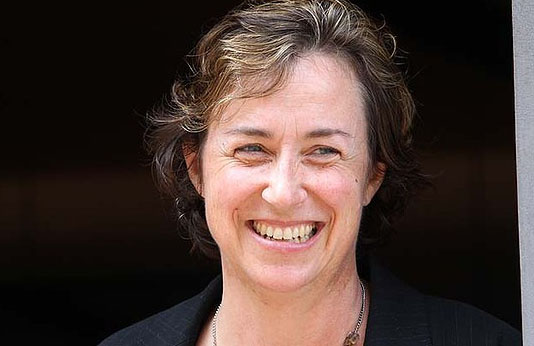 |
Cate Kennedy came into notice with her novel The World Beneath in 2009, but she is mainly known for her short stories. She has a new collection of them titled Like a House on Fire and she recently spoke to Helen Garner for "Readings". |
'Everything's ordinary in my work,' she says when we sit down to talk about her new short story collection, Like a House on Fire. 'The whole confessional thing, where you're always taking your own emotional temperature, is no use to me. I don't have any lofty ambitions. And I don't want characters who are larger than life. I live in a very ordinary place, a farm on a river. I listen to other people and I hear what they're saying. The gift is the ordinariness - things that are well-used, unexpressed, taken for granted. I love to look at those things in a fresh way.
'People often say there has to be drama in a story, but I think, what about the day after the drama? You've had the baby or the bike accident, and you wake up the next morning. I'm really interested in aftermath - what we do with what's happened to us.'
'Like the woman in your poem who's lost a baby,' I say. 'Every morning waking is like going through a windscreen.'
'Yes,' she says, 'I'm interested in the way people behave when power has been stripped from them. The way they put themselves back together again. Not so much what they're feeling or thinking, but what they do. We're revealed by our actions. I want people in my stories to act, even if what they're doing seems distorted or deformed by the damage that's been done to them. That's what keeps me watching them.'
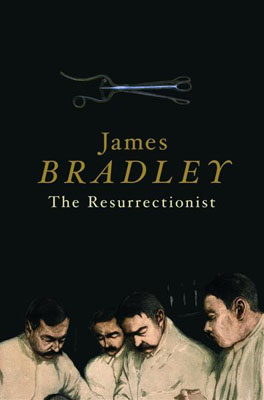
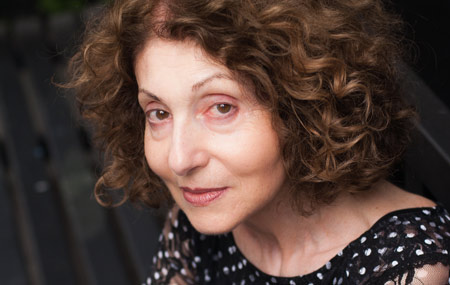 |
Lily Brett won the NSW Premier's Literary Award for Fiction in 1995 for her novel Just Like That, and the Commonwealth Writers Prize, South East Asia and South Pacific Region, Best Book award in 2000 for Too Many Men. She recently published her fourth novel, Lola Bensky, and spoke to Jessica Au for "Readings" |
Lola Bensky follows a 19-year-old rock journalist as she traverses the music scene from London to LA in 1967. You also began your career writing for Australian rock newspaper Go-Set at 18. Do you think that writing from or of ourselves allows for greater depth or truth?
I think that one way or another we all write from our own experience. No-one else is creating the characters or the stories. Whether the facts or the storylines match our real lives is irrelevant. I think it is important to write about what you know. What you care about. What matters.
I try to be as honest as I can when I write. I try not to flinch or to disguise or shy away from something that might feel very painful to me. I want people to know who they are reading about, whether the character is a rock journalist or a private detective.
Lola shares several contemplative moments with Jimi Hendrix, Janis Joplin and co. - music icons that you also interviewed over the years. There's a charisma and vulnerability to each of these characters as we see them through Lola's eyes. How do you approach writing these real-life personalities in fiction?
When I write about real-life personalities in fiction, I want to make those portraits as accurate as I can. I want to portray the people I am writing about as real people, which they are. I did this in my novel, Too Many Men, with Rudolph Hoess, the commandant of the death camp Auschwitz. I wanted to show Rudolph Hoess as a real person - a husband, a father, a hard worker, someone we could all identify with, not as someone you could easily dismiss as just a monster.
I thought about Lola Bensky and that period of time in the mid to late 1960s for many years before I wrote the book. I made a lot of notes. When I did start writing it was very intense. I worked seven days a week for 11 months. I barely went outside. I was certain that I must be suffering from a vitamin D deficiency because of the lack of sunlight.
I love the feeling of being immersed in a novel. Being so steeped in another world that that world becomes your reality. For the entire time I was writing Lola Bensky I was in 1967. The fact that it was 2011 barely registered. One of the surprising things about writing is that if you are still enough, memories and feelings that have been buried for decades can emerge with great clarity.